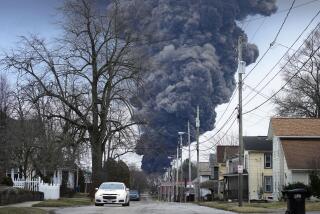Chemical Plant Closes as Union Dispute Continues
SANTA FE SPRINGS â The Neville Chemical Co. plant, deadlocked with 17 union members for more than five months over demands that it conduct tests on employees for the presence of toxic substances, has shut its doors.
Effective Nov. 2, the companyâs accounts were turned over to Dover Chemical Corp. of Ohio for an undisclosed sum, and Neville stopped producing chlorinated paraffin at its two plants in Santa Fe Springs and Pittsburgh. Dover will also take the Santa Fe Springs plantâs equipment, inventory and raw materials.
âIt was in the best interest of the company to exit the chlorinated paraffin business,â said vice president Thomas McKnight from Nevilleâs corporate headquarters in Pittsburgh. The company has operated the plant here for 20 years.
Last year, the company was convicted of illegally burying more than 20 55-gallon drums of hazardous chemicals on the grounds of the plant, and was fined $40,000. Some of the drums contained orthodichlorobenzene, a solvent that can carry the dioxins and furans into the water table, and can cause damage to the human central nervous system as well as the liver and kidneys.
Used in Fire Retardants
The production of chlorinated paraffin, an additive to fire retardant, traffic paint and some lubricants, has been paralyzed since the strike began on May 20.
Nevilleâs 17 production workers, members of the Oil, Chemical and Atomic Workers of the AFL-CIO, broke off negotiations on a new three-year contract over Nevilleâs refusal to test for the presence of dioxins and furans, suspected cancer-causing agents produced in the manufacturing process.
Neville officials would not agree to medical testing because a âsound and meaningful methodologyâ was not available, McKnight said. He also said that exposure to dioxins and furans has not been directly linked to health problems in humans.
Union representative Brent Hardwick agreed that the âjury is still outâ on the effects of the chemicals on humans, but he said animal studies have shown that dioxins and furans are extremely toxic in small amounts, and that they accumulate in the blood and body fat.
$1,500 for Each Test
When union representatives in July presented Neville with a testing proposal, which would involve the cooperation of the UC Irvine Medical Center and a Swedish authority on dioxins and furans, Neville again declined to pay the $1,500 per blood serum test, Hardwick said.
Union members had not met again with any high-level Neville officials, until Tuesday, when Neville executives informed them the plant was closing for good.
Hardwick said the union is looking at the possibility of filing a charge with the National Labor Relations Board against Neville for failure to bargain in good faith because âthat kind of negotiation doesnât happen overnight.â
âIf they were bargaining with Dover when they should have been bargaining with the union, then they bargained in bad faith,â Hardwick said.
McKnight said he is ânot entirely sureâ how long negotiations between Neville and Dover took, and would not discuss terms of the agreement.
Drilling Bids Sought
The state Department of Health Services issued a âremedial action orderâ Dec. 10, 1986, requiring the company to test the soil at the site for contamination. Bids are now going out for drilling at the site to determine the lateral and vertical extent of soil and ground water contamination, said Jack Ferguson, plant manager.
Said Hardwick: âI think we lose sight if we make this strictly an environmental issue. It is absolutely imperative sooner or later that they determine whether the men who worked there were contaminated, not just the dirt or water--they donât get sick.â
Neville retains the real estate and the plant at 12800 Imperial Highway, and âhas no plans for the plant at this time,â according to Ferguson. No other production is taking place at the plant.
Dover Chemical Corp. is a subsidiary of ICC Inc., and is one of a handful of producers of chlorinated paraffin in the nation.
More to Read
Inside the business of entertainment
The Wide Shot brings you news, analysis and insights on everything from streaming wars to production â and what it all means for the future.
You may occasionally receive promotional content from the Los Angeles Times.






